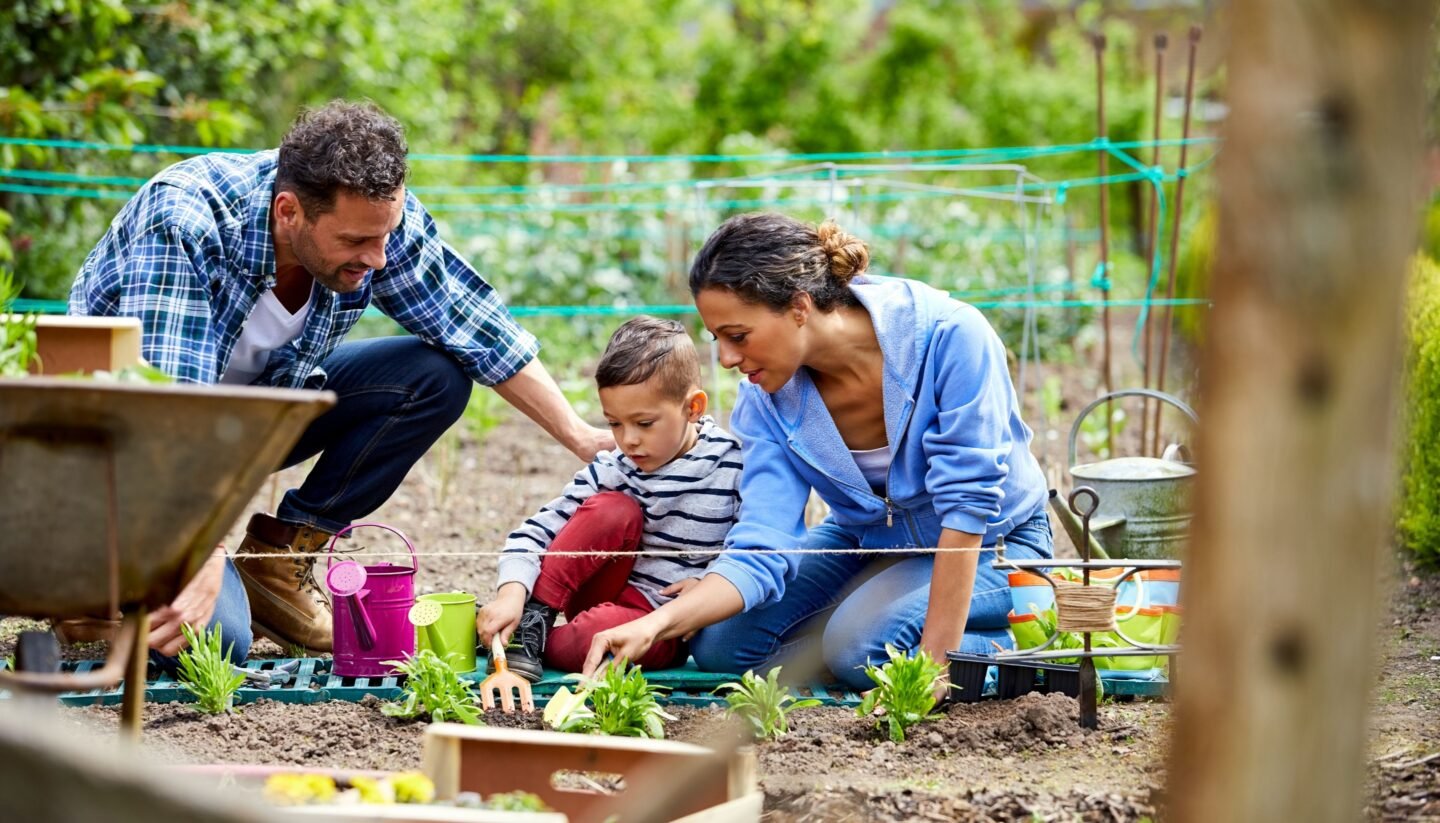Gardening is a ton of fun for adults and kids alike. You can also enhance your outdoor space and add curb appeal with a lovely garden. If you’re worried about the cost of gardening and landscaping, don’t sweat it. You can create a beautiful garden with your kids for practically no money! Read this guide if you’d like to learn how to save money and start a family garden on any budget.

Start a Compost Pile
Compost is a natural fertilizer that can help plants grow. Chances are, you’ve already got some trash items that can make great compost. Certain items you’d typically throw away or toss in the garbage disposal can make the best compost, such as fruit and vegetable peels, coffee grounds, eggshells, chicken bones, and pet waste. It may sound gross, but this trash decomposes naturally in your garden to enrich the soil, making plants grow better. As a bonus, you don’t have to spend money on fancy fertilizers, and your compost can be made out of items you’re already purchasing and throwing away.
Collect Rainwater
If you’re worried about using more water for the garden than you can afford, consider harvesting rainwater. Rain acts as a natural watering can for plants. If you collect some in a container, you can use it on your plants during drier periods at no additional cost to your water bill. You will want to ensure it is legal to harvest rainwater in your area.
Use Native Seeds or Plants
Buying plants at your local nursery may seem quick and convenient, but costs increase quickly, especially if you buy fully grown plants. Consider harvesting some native seeds to plant in your garden. You can transplant local plants if it is legal in your area if you don’t want to germinate seeds. Taking advantage of native plants is great for the environment, too, as it reduces invasive species and nurtures other wildlife.
Research Plant Care
Before buying plants, you should know how to care for them. If your plants die, replacing them can cost a lot of money or resources. Research the plants you plan on growing to understand their water and sunlight needs. If you aren’t sure what the plant is, take a picture of it and do an image search. You can also look up local plants to get your answer.
Perennial Perks
When choosing plants for your garden, consider perennials. Perennial plants or flowers endure harsher weather and grow back yearly in the spring. Alternatively, annual plants die each year and require replacement, which can cost unnecessary money.
Take Advantage of Mulch
Using mulch in your garden can save you a lot of money on weedkiller ingredients, water, and fertilizer. Not only is mulch a cost-effective garden barrier, but it also suppresses weeds, keeps the soil fertilized and watered, and helps maintain ideal temperatures. Mulch can be even more cost-friendly when you buy in bulk; it will last forever for small gardens. I found the best price on mulch for sale near me by comparing different vendors and buying in bulk.
Planters and Raised Beds
If your family likes the look of a portable or elevated garden, consider building some planters or raised beds. You can use many materials, such as used tires, broken wheelbarrows, or old pasta strainers to create your own planters for free. Whatever material you use, make sure it has drainage holes. Planters or raised beds can help prevent many pests or weeds from disturbing your garden for free.
Include Rock Gardens
Plants require a lot of hands-on care. You can limit plant life to a few areas in your garden but still fill your outdoor space with beautiful rock gardens. You can even use some zen garden inspiration with sand for a peaceful, themed look. You can find rocks anywhere, which can deter weeds when strategically placed. You can decorate the stones for some additional flair.
Find Repurposed Materials
No matter what garden or outdoor space you want, consider using repurposed or upcycled materials to save money. Build your own instead of buying flowerpots, flowerbed edges, or planters! Natural rocks can make good lawn ornaments or flowerbed edges. Old or used bricks or cinderblocks can work well for this, too. You can use old juice or milk cartons to harvest and store rainwater. Repurposing trees as privacy fencing or walls works well for a garden. Reducing resource waste not only helps your wallet but also helps the environment.
Conclusion
Building and raising a garden with your kids will create some fond memories. Even if you’re tight on money, you can start a garden for free. The outside world offers free natural materials like plants, seeds, soil, and water. Use repurposed items to build flowerbed edges, pots, or planters. Composting with your organic trash can create a free fertilizer. If you want to make small purchases, consider mulch to deter weeds and perennial plants that can potentially last for years. Happy gardening!
*This is a collaborative post. All views and texts are my own.